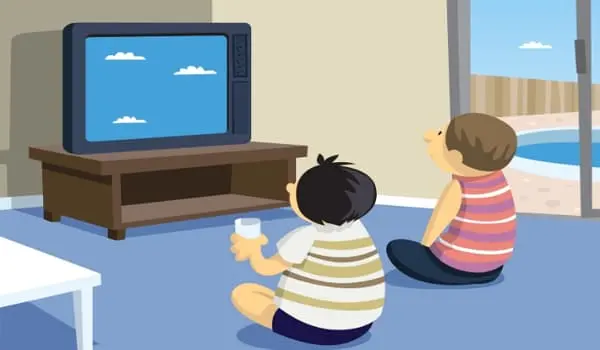According to a new study, the more parents conversed with their preschoolers during shared TV time, the more likely those children were to have higher levels of curiosity when they entered kindergarten. This was especially true for children from low-income families.
On TV, there’s no shortage of talking animals or cute Disney characters to keep your toddler entertained. After a year, your child may start pointing to the TV, looking for the remote, or attempting to say the name of their favorite show!
Perhaps your child can’t stop dancing when their favorite TV show’s jingle or theme song starts playing. Or when they see their favorite character, their face lights up from ear to ear! Television can be used as an educational tool. It’s enjoyable for your child to learn new words, lessons, and activities because it’s fun and engaging.
Increased television viewing for young children has been linked to slower development progress in some areas. Talking while watching the screen could be one way to counteract those negative effects. According to a new study, the more parents conversed with their preschoolers during shared TV time, the more likely those children were to have higher levels of curiosity when they entered kindergarten. This was particularly true for children with socioeconomic disadvantages.
We know that more frequent parent-child conversation promotes several aspects of early child development, and this may also be true for promoting a child’s curiosity. Our findings highlight the importance of parent-child interaction in promoting early childhood development and curiosity, particularly for children from low-income families.
Prachi Shah
“Our findings highlight the importance of parent-child interaction in promoting early childhood development and curiosity, particularly for children from low-income families,” said lead author Prachi Shah, M.D. M.S., a developmental and behavioral pediatrician at University of Michigan Health C.S. Mott Children’s Hospital.
“We know that more frequent parent-child conversation promotes several aspects of early child development, and this may also be true for promoting a child’s curiosity.” Sitting alone in front of the TV or while your parents are on their phones? Perhaps not so helpful. However, watching a show, movie, or other content with parents while conversing may be associated with fostering a preschooler’s curiosity, according to Shah.
Researchers measured early childhood curiosity in kindergarten after measuring hours of daily television exposure and frequency of parent screen-time conversation among 1,500 preschoolers. The findings have been published in the journal PLOS ONE.

The study focused specifically on curiosity levels, which Shah’s previous research has found to be associated with enhanced learning and higher academic achievement in reading and math at kindergarten, as well as behavioral-developmental benefits, particularly for children from low-income families.
“Curiosity is an important foundation for scientific innovation, joy in learning, and a variety of positive outcomes in childhood,” Shah explained. “We want to learn more about what sparks curiosity in young children so that we can find ways to close the achievement gap caused by poverty. Parent-child interaction promotes children’s thinking, learning, and exploration – all of which are behavioral indicators of curiosity” She continued.
Researchers examined data from the Birth Cohort of the Early Childhood Longitudinal Study. The cohort is a nationally representative, population-based study funded by the United States Department of Education that has followed thousands of children since their birth in 2001.
Curiosity was measured using parent questionnaires that asked about traits of curiosity such as eagerness to learn new things, a desire for novelty, an openness to new experiences, imagination, and adaptability to new situations, among other behaviors.
While many young children are now growing up with digital media exposure via mobile devices such as tablets and phones, televisions continue to be the most popular screen activity, accounting for 72 percent of all screen time. “Because televisions are in 98 percent of all homes, television exposure remains a relevant developmental context in young children,” Shah said.
Children are reportedly exposed to one to four hours of television per day, with higher exposure in economically disadvantaged children. Excessive media exposure, including television, can displace exploratory activities such as play and parent-child interactions, which are thought to be important in developing children’s curiosity, according to Shah.
“Our findings suggest that parents should look for opportunities to foster conversational exchanges with their young children in daily routines, including while watching television,” Shah said.















